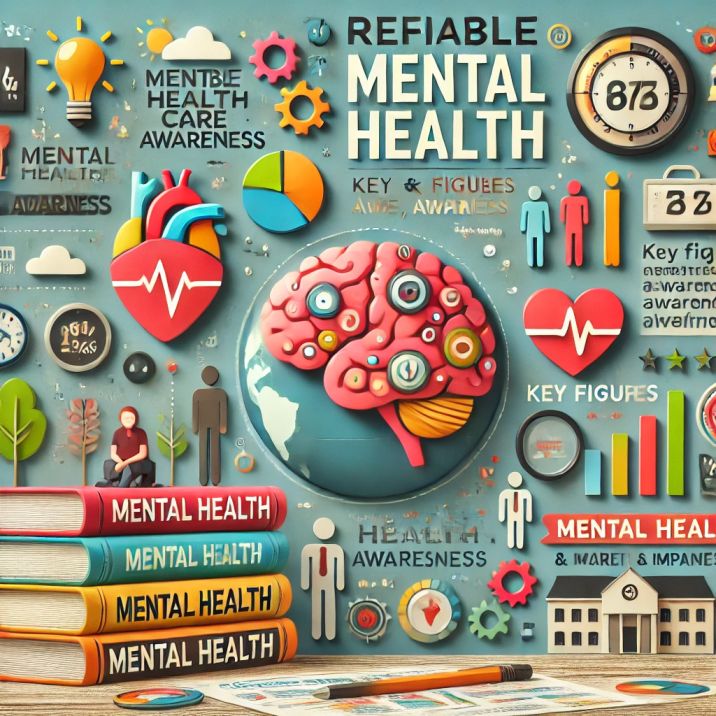Mental health awareness is more important than ever in today’s fast-paced world. With increasing personal and societal stressors, understanding mental health has become a critical aspect of fostering well-being. By addressing mental health issues openly, we can create a more supportive and empathetic society.
Raising mental health awareness is not just about recognizing mental health conditions but also about building a community that values and prioritizes mental well-being. It’s about educating ourselves, advocating for others, and creating safe spaces for open dialogue.
This blog post will explore ten essential tips for raising mental health awareness in your community. These actionable steps can make a lasting difference from starting conversations to leveraging social media.
Table of Contents
1. Start Conversations About Mental Health

How to Start a Conversation About Mental Health
Initiating a conversation about mental health can feel intimidating, but with the right approach, it becomes much easier. Here are some practical tips to get started:
- Choose the Right Setting
Find a private, comfortable space where you can speak without interruptions. This ensures both you and the person feel safe sharing openly.
Start with simple, non-judgmental questions like:- “How have you been feeling lately?” Is there anything you’d like to share on your mind?”
- Be a Good Listener
Sometimes, people need someone to listen. Avoid interrupting or offering immediate advice unless asked. Reflect on what they’re saying to show you understand. - Share Your Own Experience (If Appropriate)
Sharing a personal story about mental health can help the other person feel less alone and more comfortable opening up. - Encourage Professional Help
If someone shares that they’re struggling, gently encourage them to seek help from a mental health professional. You could say:- “Have you thought about talking to a counselor or therapist? They might be able to help.
- Follow Up
Check-in with them after the initial conversation to show you care and are there for support.
Benefits of Mental Health Awareness
Promoting mental health awareness can have a significant positive impact on individuals and communities. Benefits include:
- Reduced stigma around mental health issues.
- Increased access to mental health resources.
- Stronger relationships through open communication.
- Improved overall well-being and quality of life.
2. Share Reliable Information about Mental Health Awareness

Acknowledging mental wellness is essential in today’s fast-moving world. It helps individuals grasp the importance of mental health, recognize the signs of mental health issues, and find the resources they need for assistance. By disseminating trustworthy information about mental health awareness, we can help eliminate the stigma associated with mental illnesses and foster stronger, healthier communities.
What is Mental Health Awareness?
Mental health awareness refers to understanding mental health conditions, their impact on individuals, and the need for early intervention. It aims to educate people about the significance of mental health and create an environment where discussing mental health is normalized.
Key Points:
- Mental health affects how we think, feel, and behave.
- It includes emotional, psychological, and social well-being.
- Awareness encourages individuals to seek help without shame.
Why Sharing Reliable Information Matters
Misinformation about mental health can lead to misunderstandings and prejudice. By sharing reliable information, we can:
- Educate people about common mental health conditions like anxiety, depression, and PTSD.
- Highlight the availability of resources like therapy, helplines, and support groups.
- Promote empathy and understanding among communities.
How to Identify Reliable Sources
When sharing information about mental health, it is crucial to rely on credible sources. Here are some tips:
- Look for information from mental health organizations like the World Health Organization (WHO) or the National Alliance on Mental Illness (NAMI).
- Avoid unverified claims on social media or non-reputable websites.
- Share articles, videos, or studies backed by scientific evidence.
Ways to Spread Mental Health Awareness
- Social Media Campaigns: Share facts, personal stories, and tips with your audience.
- Community Events: Organize workshops or talks with mental health professionals.
- Educational Materials: Create eBooks, blogs, or flyers with practical advice.
- Advocacy: Collaborate with influencers or brands to amplify the message.
Encouraging Open Conversations
One of the most effective ways to increase mental health awareness is by encouraging open conversations. Listening without judgment and offering support can make a huge difference in someone’s life.
- Start by asking, “How are you feeling today?”
- Be a source of comfort and understanding.
- Avoid stigmatizing language when discussing mental health topics.
Sharing reliable information about mental health awareness is a powerful way to create positive change. By spreading accurate knowledge and fostering understanding, we can help break the stigma and ensure that mental health is prioritized just as much as physical health. Start today by sharing something meaningful, whether a statistic, a resource, or simply a kind word.
3. Organize Mental Health Workshops to Promote Mental Health Awareness

Hosting mental health workshops is a powerful method to enhance awareness regarding mental well-being. These sessions offer a supportive environment for individuals to explore mental health topics, exchange personal stories, and acquire strategies for boosting their overall wellness. Be it in educational institutions, offices, or local community hubs, these gatherings can leave a meaningful and enduring impression.
Why Mental Health Workshops are Important
Workshops focused on mental health awareness play a critical role in:
- Educating: Providing reliable information about mental health conditions and their management.
- Reducing Stigma: Creating an open environment for discussions about mental health.
- Building Skills: Equipping attendees with coping strategies and self-care techniques.
- Connecting Resources: Introducing participants to local mental health professionals and support networks.
Steps to Organize a Mental Health Workshop
Define the Objectives
Start by determining the purpose of the workshop. Is it to raise general awareness, provide stress management techniques, or support those with specific mental health conditions?
Choose the Right Venue
Select a venue that is accessible, comfortable, and conducive to learning. Online platforms like Zoom can also be used for virtual workshops.
Invite Mental Health Experts
Collaborate with psychologists, counselors, or mental health advocates who can provide accurate information and lead meaningful discussions.
Prepare Informative Content
Create a structured agenda covering topics like:
- Understanding mental health conditions.
- Stress management and mindfulness techniques.
- Resources for seeking help.
Ensure the content is simple, practical, and tailored to the audience.
Engage the Participants
Use interactive activities like group discussions, Q&A sessions, or role-playing scenarios to engage the workshop.
Provide Handouts and Resources
Distribute brochures, worksheets, or links to useful online resources so attendees can continue learning after the workshop.
Gather Feedback
At the end of the session, feedback will be collected to improve future workshops. Use surveys or short questionnaires to measure the impact.
Benefits of Mental Health Workshops
- Improved awareness about mental health and its importance.
- Enhanced coping skills for managing stress and anxiety.
- Stronger community bonds and mutual support networks.
- Early intervention by encouraging attendees to seek help when needed.
Tips for a Successful Workshop
- Use inclusive language and make the workshop welcoming for all participants.
- Keep the session interactive and avoid long, lecture-style presentations.
- Share relatable stories or examples to help participants connect with the topic.
Mental health workshops are a powerful tool to promote mental health awareness. Organizing these events can foster understanding, provide valuable resources, and positively impact people’s lives. Start planning today and take a step towards building a more mentally healthy community.
4. Partner with Local Organizations to Promote Mental Health Awareness
Partnering with local organizations is a powerful way to amplify efforts to promote mental health awareness. By working together, you can combine resources, reach a broader audience, and create a stronger impact in your community. Collaboration with schools, non-profits, businesses, and healthcare providers can help normalize conversations about mental health and offer much-needed support.
Benefits of Partnering with Local Organizations
- Wider Reach: Local organizations often have established connections within the community, allowing you to reach more people effectively.
- Resource Sharing: Collaborations enable the pooling of resources, such as funding, venues, or expertise.
- Credibility: Partnering with trusted local organizations enhances the credibility of your mental health awareness initiatives.
- Sustainability: Partnerships can lead to long-term initiatives that continue to benefit the community.
Steps to Partner with Local Organizations
Identify Potential Partners
Look for organizations that share similar values and goals, such as:
- Mental health clinics or counseling centers.
- Schools and universities.
- Non-profits focused on health or social services.
- Community groups and local businesses.
Reach Out and Build Relationships
Contact organizations with a clear proposal that outlines:
- The purpose of your mental health awareness campaign.
- How the partnership will benefit both parties.
- Specific activities or events where collaboration is possible.
Plan Collaborative Activities
Work together to organize events and initiatives, such as:
- Mental health workshops or seminars.
- Community outreach programs.
- Fundraising campaigns for mental health resources.
Leverage Shared Resources
Pool resources like funding, venues, promotional materials, and expertise to create impactful campaigns. Ensure each partner’s contribution is recognized.
Promote Joint Efforts
Use social media, email newsletters, and local media outlets to promote your partnership and events. Highlight the collaboration to inspire trust and attract more participants.
Evaluate and Strengthen the Partnership
After completing an initiative, evaluate its impact and gather feedback. Use this information to improve future collaborations and strengthen the relationship with your partners.
Examples of Collaborative Efforts
School Campaigns: Partner with schools to host mental health awareness days, student workshops, or counseling sessions.
Community Wellness Fairs: Collaborate with local businesses and healthcare providers to offer free mental health screenings and resources.
Support Groups: Work with non-profits to organize support groups for specific mental health conditions, such as anxiety or depression.
Partnering with local organizations is a practical and impactful way to advance mental health awareness. By combining efforts, you can create meaningful initiatives that educate, support, and empower your community. Start reaching out to potential partners today to make a difference together.
5. Leverage Social Media for Advocacy
Social media is a powerful tool for raising mental health awareness. Use platforms like Instagram, Facebook, and Twitter to:
- Share inspiring stories or quotes.
- Post educational content about mental health.
- Host live Q&A sessions with mental health professionals.
Tips for Effective Social Media Campaigns
- Use hashtags like #MentalHealthAwareness to increase visibility.
- Create visually appealing posts with graphics or videos.
- Engage with your audience through polls, comments, or direct messages.
- Highlight community efforts and success stories.
Social media allows you to reach a global audience, making it an invaluable resource for advocacy and education.
6. Encourage Self-Care Practices

Promoting self-care is a vital part of mental health awareness. Help your community understand the importance of:
- Exercise, healthy eating, and adequate sleep.
- Mindfulness practices such as meditation or yoga.
- Regular breaks from work or stressful activities.
How to Promote Self-Care
- Organize community fitness classes or wellness fairs.
- Share self-care tips through newsletters or blogs.
- Distribute self-care kits with journals, aromatherapy oils, or stress balls.
By emphasizing self-care, you empower individuals to take proactive steps toward maintaining their mental well-being.
7. Celebrate Mental Health Awareness Days
Observing mental health awareness days can create a significant impact. Examples include:
- World Mental Health Day (October 10).
- Mental Health Awareness Month (May).
Activities for Awareness Days
- Host awareness walks or fundraisers.
- Provide free mental health resources or screenings.
- Organize art exhibits or storytelling events to share personal experiences.
These events raise awareness and foster a sense of community and solidarity.
8. Support Local Mental Health Initiatives
Supporting existing mental health initiatives can strengthen your community’s efforts. Volunteer your time or resources to:
- Nonprofit organizations.
- Local helplines or support groups.
- Community outreach programs.
Ways to Contribute
- Donate funds or supplies.
- Advocate for increased funding for mental health programs.
- To support campaigns, offer your skills, such as graphic design or event planning.
Collaborating with established initiatives ensures that your efforts align with broader community goals and have a lasting impact.
9. Create a Safe Environment for Open Dialogue
A supportive environment encourages people to speak up about their struggles. To build a safe space:
- Promote confidentiality in discussions.
- Train community leaders to handle sensitive topics with care.
- Set clear guidelines to ensure respectful interactions.
Impact of a Safe Environment
- It reduces the fear of judgment.
- It fosters a sense of belonging and support.
- It encourages early intervention by allowing people to seek help without hesitation.
Creating a safe environment is fundamental to building a community that values mental health.
10. Lead by Example
Finally, lead by example. Show your commitment to mental health awareness by practicing what you preach:
- Prioritize your mental well-being.
- Be a compassionate listener and advocate for others.
- Share your journey to normalize seeking help and support.
How Leadership Inspires Others
- It motivates others to take action.
- It normalizes mental health discussions within the community.
- It demonstrates the positive impact of prioritizing mental well-being.
Conclusion
Mental health awareness is a collective effort that begins with individual actions. We can create a community that values and supports mental well-being by fostering open conversations, sharing reliable information, and encouraging self-care. Each small step helps reduce stigma and build a culture of understanding and compassion.
Building mental health awareness is not just about addressing challenges but celebrating resilience and empowering individuals to thrive. With tools like workshops, social media advocacy, and partnerships, we can inspire meaningful change and promote a healthier society.
Remember, mental health awareness is more than a campaign; it’s a commitment to creating a better future for everyone. Let’s work together to make mental health a priority in our communities.










